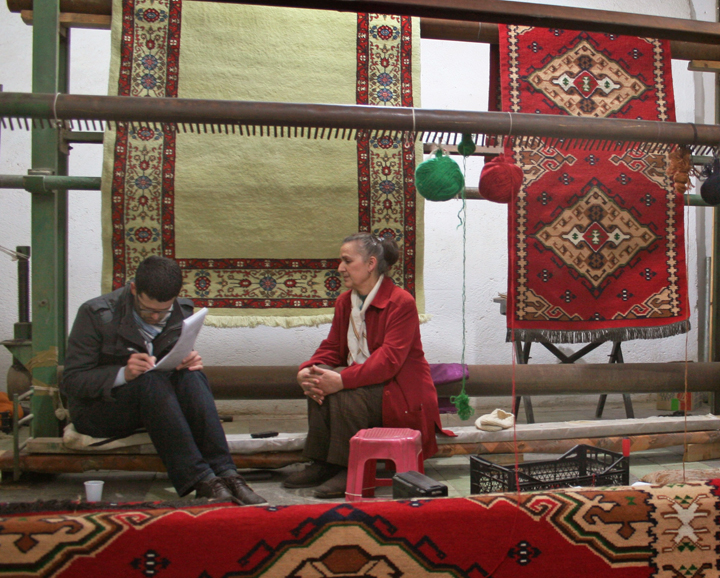

An old craft creates opportunities for Albania’s new generation

By Daniela Zampini
A year ago, during a cold winter day in the far northeast of Albania, 58-year-old Hate Ora heard an item on a local television broadcast that would change her life: authorities were launching a “Territorial Employment Pact for Youth” to provide work for young people in the Kukes region, one of the country’s most remote and marginalized areas.
Ora, a weaver of traditional Albanian rugs, got up from her chair and informed her family that she would go and find out in person what it was all about. “Maybe I am not young anymore,” she says with a smile, “but I know the importance of having a job. It is not so easy for a woman in Kukes, young or old as she may be, to find employment. And even when there are jobs, traditional families are not so happy to let women go work outside of the household.”
Ora had worked for more than 20 years in a state-owned factory that produced traditional Albanian handicraft for export. With the collapse of the Communist regime in the early ‘90s and the transition to a free-market economy, she found herself jobless, along with 1,000 other women from the surrounding communities. Ora struggled to continue working from home.
“It was very difficult,” she recalls tearfully. “For many years we have been living, the four of us, in a 25m2 room, where I also carved out some little space to install my working tools. We were cooking there, sleeping there…when I would get an order for carpets, I would work very long hours. It was a way to survive, for me and for my family.”
Today, thanks to her determination and the MDG-Fund-supported “Territorial Employment Pact” (Y-TEP), Ora has transformed herself from an informal worker into a successful woman entrepreneur. At her newly refurbished workshop, she offers on-the-job training and employment opportunities to young women from her community, combining her long experience and their new energies in the manufacturing of traditional Albanian textile handicraft, particularly colourful carpets.
Ora is a beneficiary of the MDG-Fund’s UN Joint Programme on Youth Employment and Migration, a collaboration between four UN agencies and the Albanian government to create decent work opportunities for marginalized young people and to help the country manage the internal migration of youth in search of jobs.
In the case of the Y-TEP initiative, the Joint Programme consulted community members to assess income-generating opportunities. Feasibility studies were then carried out for the economic activities that had been identified, including an analysis of specific training needs such as technical and entrepreneurial skills training and small enterprise management.
“I brought my ideas on how traditional handicrafts could be a source of employment for women from the community. I would like to pass on my craft and train other young people in this trade,” says Ora, who participated in the community dialogues.
The Albanian Artisans Association helped Ora organize her ideas into a business plan as part of the Y-TEP -- a commitment signed by more than 40 local and national actors to a common set of interventions. She received basic entrepreneurship training and business advisory services, together with access to small credit.
Ora started attending artisans’ fairs and produced promotional materials and leaflets to distribute to customers. “The other members of the Albanian Artisans Association, small artisans like me, showed me how I could diversify my products. So I did, and more customers started approaching me.”
Her business plan persuaded a local bank to finance the construction of a decent workshop in the centre of the town. “Now I have moved into the new workshop; my son is working with me full time, dealing with financial planning, finding new customers and helping out with other things.” Ora has registered as a small enterprise and is now back to contributing to her pension scheme.
She has also become an employer, taking advantage of the work-training contracts available through the Y-TEP to bring three other young women to her workshop and train them on-the-job. Recently, Ora was contacted by a French enterprise interested in the production of handmade clothes. Together with other women from Kukes, she is currently producing some samples, which, if accepted, will generate further employment opportunities for young women in Kukes.
As part of the commitments under the Y-TEP, the Municipality of Kukes is even giving Ora a corner of the handicrafts section inside the town’s newly built museum where she can display her products.
With all these successes, Ora points to the Y-TEP and the support of the MDG-Fund as the turning point for her. “Perhaps it is because I have struggled so much throughout my life, but I know that when you are given an opportunity you need to grab it. Is that what you call ‘being entrepreneurial’?”
The UN Joint Programme “Albania: Youth migration: Reaping the benefits and mitigating the risks,” is financed by the MDG Achievement Fund and targets under-employed youth and young people working informally in subsistence agriculture in the regions of Shkodra and Kukes. A collaboration between the Albanian government, local authorities and four UN agencies (ILO, IOM, UNDP/UNV and UNICEF), the programme has already benefitted more than 940 youth.
The programme's approach is to strengthen the capacity of labour market institutions through a youth employment action plan; to devise strategies that minimize the risks of migration of youth from rural areas; and to increase the positive impact of migration through better allocation of resources for youth employment. The Programme also supports the return to Albania of young professionals working abroad and the mobilization of resources through public-private partnerships for youth employment.
Click here to read about the MDG-F's work in Albania.
Click here to read other success stories from the MDG-F's work to fight poverty and improve livelihoods around the world.